May 30, 2025 | 11:55 GMT +7
May 30, 2025 | 11:55 GMT +7
Hotline: 0913.378.918
May 30, 2025 | 11:55 GMT +7
Hotline: 0913.378.918
When rice yield and area expand in the Mekong Delta, so does the use of agricultural products including chemical pesticides. As a result, many agricultural products pose great risks to the ecological environment.
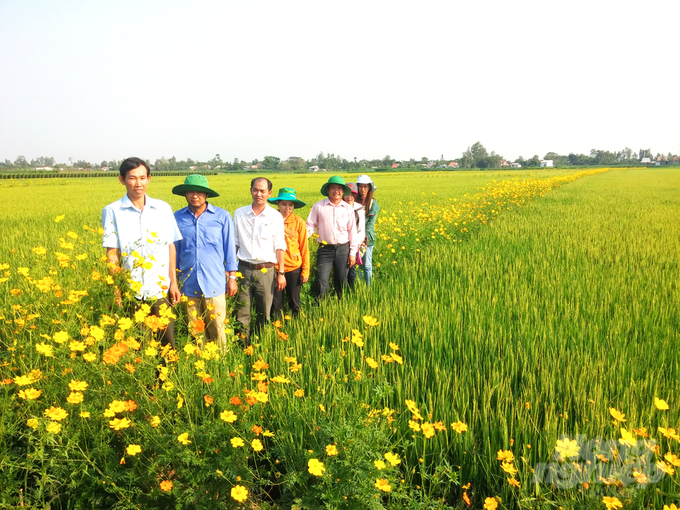
“Rice fields, flower banks” is one of the few agricultural models to be recognized and applied by farmers in the Mekong Delta. Photo: Le Hoang Vu.
The three primary categories of pests in a rice field, according to agricultural experts, are diseases, weeds, and animals, the majority of which are sucking insects. Groups of sucking insects such as worms, planthoppers, thrips, etc. can cause damage at all stages of rice growth and development, so farmers often use high amount of toxic chemical pesticides to prevent these pests.
Various studies and production practices have proven that in rice fields, predatory parasites and insect-damaging fungi, also known as natural enemies, play an indispensable role in rice farming. Natural enemies can prevent the growth of pest populations, so farmers who abuse chemical pesticides will disturb the ecosystem of their fields, creating a biological imbalance that favors the growth of pests. On the other hand, farmers will increase the dose of chemical pesticide when an outbreak of pests occurs, resulting in a vicious cycle.
With the ecological rice farming model, farmers will have the ability to increase the number and activity of beneficial organisms or natural enemies, promote biodiversity, and balance the ecosystem in the rice fields. This technological advancement has been applied in various countries with advanced agricultural production around the world. It is also considered an effective and safe pest control solution that allows rice farmers to save on production costs and contribute to the protection of the ecological environment, resulting in a safe and sustainable agricultural production process.
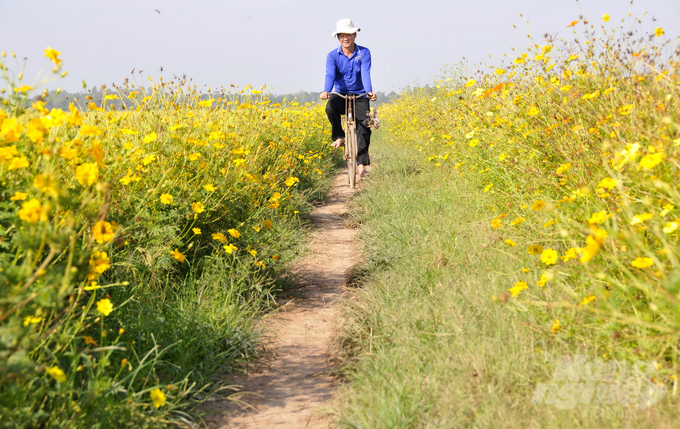
The model of "rice fields, flower banks" not only attracts natural enemies that limit the growth of pest populations, but also creates peaceful and poetic landscapes for rural villages. Photo: Le Hoang Vu.
The program "Community management of brown planthoppers and leaf rollers in rice fields and flower banks using ecological technology" has been deployed by the Department of Plant Protection since the winter-spring crop from 2009 to 2010. The program was first implemented in Tien Giang province and it has since been expanded to many provinces in the Mekong Delta.
Many technological advancements have been implemented to change farmers' production practices with support from the agricultural sector. Namely, the technical process of ecological rice farming, also known as the " rice fields, flower banks" model has assisted farmers in protecting and attracting natural enemies, managing harmful organisms, reducing the use of pesticides, improving the quality of rice, and contributing to the protection of the ecological environment.
The model of "rice fields, flower banks" quickly earned the trust of rice farmers and expanded to other provinces in the Mekong Delta. As a result, farmers have gradually formed pesticide-free rice fields throughout Western Vietnam.
Mr. Ngo Van Hai in Phu Huu commune, An Phu district, An Giang province is growing over 5 hectares of rice. He had made a significant investment in eight or nine chemical sprayers to control pests. However, the recent rise in ecological rice farming has changed his farming practices.
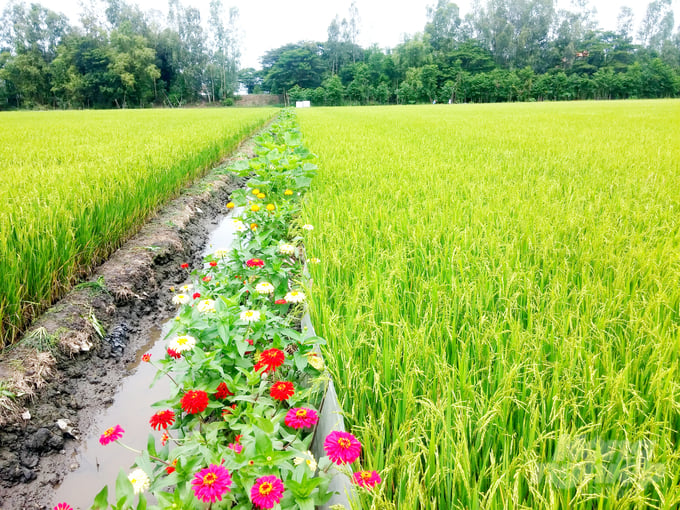
The Mekong Delta has nearly 40,000 hectares of rice cultivated under the model of "rice fields, flower banks". The majority of their products are consumed by local businesses. Photo: Le Hoang Vu.
Many farmers who are involved in the ecological rice farming model in the Mekong Delta have commented that they rely solely on agrochemicals to eradicate diseases when necessary. The use of pesticides is either limited, or removed entirely.
Farmers in Long Thanh 2 ward, Thot Not district, Can Tho city have developed from the model of "rice fields, flower banks" into a flower-growing village with nearly 30 participating households.
Mr. Nguyen Van Tien in Long Thanh 2 ward, Thot Not district, who cultivates 2.5 hectares of rice, said: "The local agricultural sector has assisted us in growing various types of flowers along the edge of the field, including Sulfur cosmos, Big Sage, Sunflower, etc. We have also utilized the open land area to grow additional crops according to market demands. In addition to the removal of harmful pests and reduction of pesticides, the model of "rice fields, flower banks" nurtures a green, clean and beautiful rural environment as well as generates stable income for farmers.
According to Mr. Tien, the model of "rice fields, flower banks" can help farmers reduce the amount of pesticides by at least 50%. Subsequently, they can save nearly 300,000 VND for every rice crop, resulting in an increase of 10% in rice farmers' profits. These are significant figures considering farmers are growing rice in increasingly unfavorable weather conditions and the current high price of agricultural inputs.
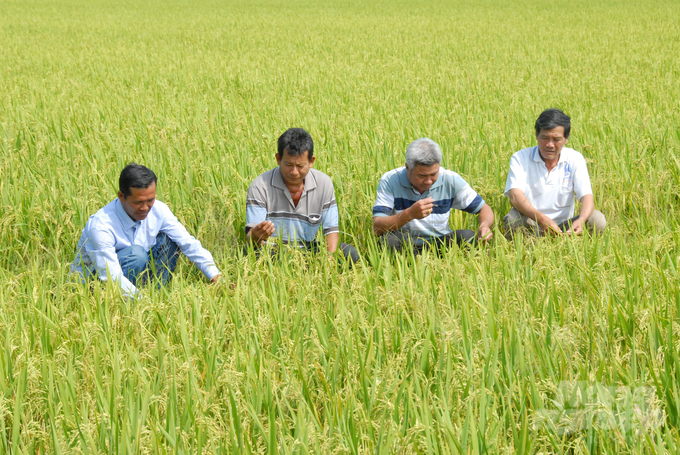
With the model of "rice fields, flower banks", farmers reduce the amount of pesticides by at least 50%. Subsequently, they can save nearly 300,000 VND for every rice crop. Photo: Le Hoang Vu.
According to Mr. Nguyen Van Hien, Director of An Giang Sub-Department of Crop Production and Plant Protection, An Giang is one of the fastest growing provinces in the Mekong Delta. It maintains a strong and stable development of the "rice fields, flower banks" model.
In order to boost the efficiency of the model, experts encouraged farmers to plant other crops such as sesame, peanut, okra in addition to colored flowers. These crops can attract natural enemies and generate significant additional income for farmers.
According to Mr. Le Van Thiet, Deputy Director of the Department of Plant Protection, farmers must implement the integrated pest management (IPM) system and the “1 must 5 reduce” process in order to cultivate rice ecologically. Namely, they must use certified seeds; reduce the amount of seeds sown; reduce the amount of nitrogen fertilizers; reduce pesticides; reduce the amount of water and the number of irrigation pumps; reduce losses during and after harvest.
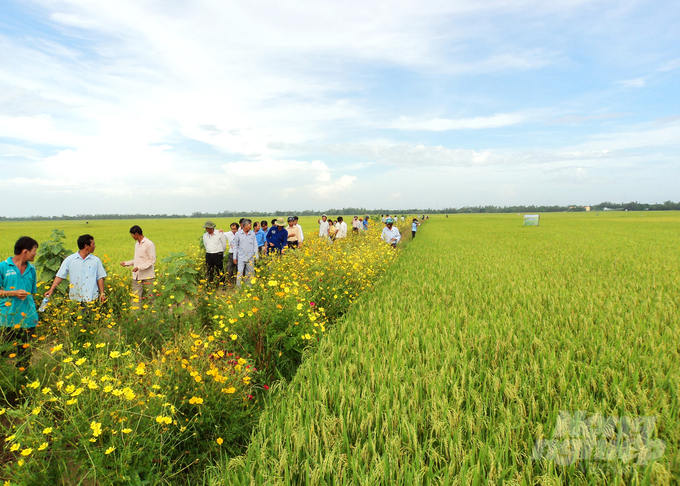
The model of "rice fields, flower banks" helps rice farmers save costs as well as protect the ecological environment and farmers' health. Photo: Le Hoang Vu.
In order to maintain a balance between pests and beneficial organisms in the field, farmers planted flowers along the embankments that surround the rice fields. The struggle for survival between natural enemies and pests will create an ecological balance in rice fields, thereby limiting the pest population without affecting the economic threshold. Furthermore, farmers does not need to rely on chemicals to eradicate pests.
“The model of ecological rice farming has been replicated in many provinces and cities in the Mekong Delta. So far, the region has nearly 40,000 hectares of rice cultivated under this model. Most of the output is processed by local businesses into products that meet the increasingly fastidious demands of the domestic and export markets", emphasized said Mr. Le Van Thiet.
Farmers' awareness has improved noticeably after participating in ecological rice farming model of "rice fields, flower banks". The majority of farmers have understood that the overreliance on pesticides to increase productivity is a misconception that needs correction. On the other hand, ecological technology not only helps farmers improve efficiency in pest management, but also contributes to building a sustainable, environmentally friendly farming system.
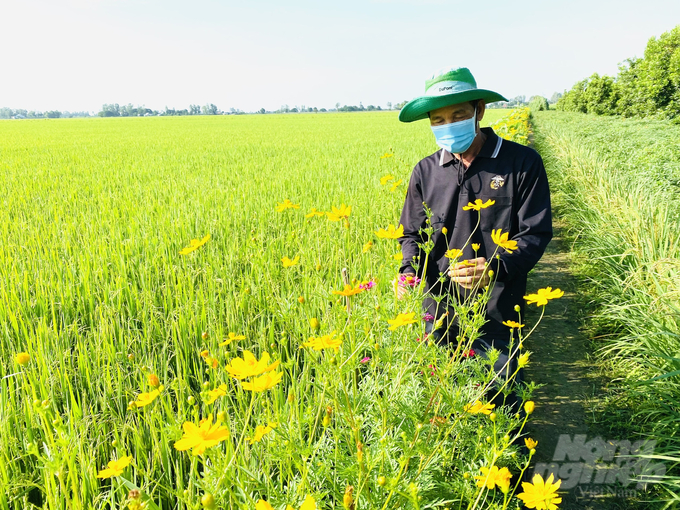
Ecological rice farming limits the amount of pests in rice fields. Additonally, it creates a green, clean and beautiful rural environment that brings in more income for farmers. Photo: Le Hoang Vu.
According to Mr. Do Van Van, Director of the Southern Center for Plant Protection under the Department of Plant Protection, the ecological rice farming model is replicated in many provinces and cities across the Mekong Delta. Nearly 40,000 hectares of rice are cultivated under the model of "rice fields, flower banks", which is a small figure compared to the total rice cultivation area in the Mekong Delta. However, this efficient and environmentally friendly rice farming model has opened up many opportunities for rice production in Vietnam's key rice regions.
In 2023, many provinces and cities in Vietnam have been developing and applying this advanced technology in large fields, smart fields and fields under the program of 1 million hectares of high-quality rice in the Mekong Delta. These fields are being gradually developed towards pesticide-free zones. This is the development trend of a friendly, safe and sustainable agriculture.
Translated by Nguyen Hai Long
/2025/05/25/4127-3-073637_820.jpg)
(VAN) Thanks to the promotion from an FAO-implemented project, vegetable production in greenhouses in Moc Chau has seen strong development, from 1.5 hectares in 2021 to nearly 50 hectares in 2024.

(VAN) FAO has recently supported USD 140,000 to implement the project 'Risk mitigation human-animal interface risks through disease control initiatives in pig farming.'

(VAN) The People's Committee of Tra Vinh province has approved an adjustment to the investment policy for the Green Hydrogen Plant project, increasing its area to approximately 52.76 hectares.
![Reducing emissions from rice fields: [2] Farmers’ commitment to the soil](https://t.ex-cdn.com/nongnghiepmoitruong.vn/608w/files/news/2025/05/05/dsc08881jpg-nongnghiep-140632.jpg)
(VAN) Clean rice cultivation model in Thuong Tan commune, Bac Tan Uyen district, is assisting local residents in achieving sustainable agriculture by substantially reducing costs, increasing productivity, and protecting the environment.

(VAN) At the conference to disseminate Resolution No. 68, AgriS introduced its digital agricultural ecosystem and reaffirmed its commitment to accompanying the Government in promoting private sector development and sustainable agriculture.

(VAN) 'Blue Ocean - Blue Foods' initiative is designed to restore marine ecosystems and establish sustainable livelihoods for local communities by cultivating a minimum of 1,000 hectares of cottonii seaweed in the first three years.
/2025/05/21/4642-3-112707_603.jpg)
(VAN) The V-SCOPE project has made direct contributions to three out of six pillars of the Comprehensive Strategic Partnership between Vietnam and Australia.